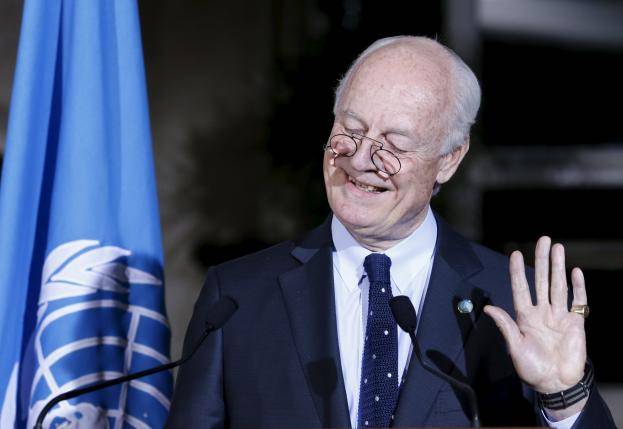Syrian regime is flouting all UN resolutions and using pretexts to avoid talks, opposition leader Asaad al-Zoubi told reporters on Wednesday after holding talks with special UN envoy in Geneva.
Zoubi, the chief mediator for the opposition High Negotiations Committee (HNC), described Assad as "the disease that has struck Syria", which can only heal once he and other emblematic figures leave.
He pointed out that Assad regime had committed 2,000 ceasefire violations and dropped 420 barrel bombs in March alone.
A truce between the regime and the opposition brokered by the US and Russia has largely been holding since February 27, but fresh fighting in northern Syria in the past four days has killed more than 100 people.
UN's Syria envoy Staffan de Mistura said that there have been incidents on the ground but cessation of hostilities were still holding.
The UN envoy said the recent upsurge in fighting amounted to "incidents and not a bush fire" as he vowed to press ahead with efforts to reach a political transition in the war-torn country despite mixed messages about the process from the Damascus regime.
A regime delegation is expected to arrive in coming days for the "proximity talks" in which the two sides meet separately with de Mistura, but with no face-to-face meeting between delegations.
Transitional government
The Syrian opposition leader said that establishment of transitional governing body is top priority in this round of talks, but earlier in the day the war-torn country’s deputy foreign minister ruled out any negotiations on the fate of Assad.
He said that the opposition has to let go of its "dream" of a transitional government, saying it would amount to a coup d'etat.
Speaking to The Associated Press in Damascus on Wednesday, Faisal Mekdad said that such an idea "will never be acceptable."
The UN’s Syria envoy, who travelled to Damascus backers Moscow and Tehran before the peace talks, said that he had told the HNC he would pursue agenda of political transition.
On the day the talks began, Assad's regime held parliamentary elections in regime-controlled areas.
Critics insist the elections are illegitimate largely because the five-year war has driven millions of Syrians from their homes, leaving them unable to vote.
But Damascus backers Russia and Iran have supported the elections, with Moscow saying the elections were needed to shore up its existing state structures until peace talks pave way for a new vote.
PHOTO CAPTION
U.N. mediator Staffan de Mistura attends a news conference after a meeting with the High Negotiations Committee (HNC) during Syria Peace talks at the United Nations in Geneva, Switzerland, April 13, 2016. (Reuters)
Al-Jazeera


 Home
Home Discover Islam
Discover Islam Quran Recitations
Quran Recitations Lectures
Lectures
 Fatwa
Fatwa Articles
Articles Fiqh
Fiqh E-Books
E-Books Boys & Girls
Boys & Girls  Articles
Articles










